By Robert Wyllie · Tuesday, January 14, 2014 As an occasional feature on TELOSscope, we highlight a past Telos article whose critical insights continue to illuminate our thinking and challenge our assumptions. Today, Robert Wyllie looks at Norberto Bobbio’s “Is There a Marxist Theory of the State?” from Telos 35 (Spring 1978).
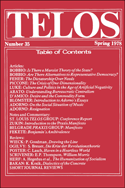 Norberto Bobbio’s 1978 article “Is There a Marxist Theory of the State?” marks a turning point in the history of Telos. The “red decade” was coming to a close in the mid-1970s, and the New Left was falling into disarray. Hence, Bobbio writes an epitaph in this 1978 article, which makes the convincing case that the Left was never able to develop a political theory that included a positive concept of the political state. In the years following Bobbio’s article, the Telos group would begin to look elsewhere. As Paul Piccone and Gary Ulmen later explained, “Telos‘ initial interest in [Carl] Schmitt’s work was triggered in the 1980s by the realization, in the collapse of the New Left and under the influence of Norberto Bobbio’s criticism, that the Left in general and Marxism in particular had no political theory.”[1] Bobbio moved Telos away from “revolution, dialectic, commodity fetishism, liberation, alienation, and monopoly capitalism”[2] to Carl Schmitt, federalism, and populism. Norberto Bobbio’s 1978 article “Is There a Marxist Theory of the State?” marks a turning point in the history of Telos. The “red decade” was coming to a close in the mid-1970s, and the New Left was falling into disarray. Hence, Bobbio writes an epitaph in this 1978 article, which makes the convincing case that the Left was never able to develop a political theory that included a positive concept of the political state. In the years following Bobbio’s article, the Telos group would begin to look elsewhere. As Paul Piccone and Gary Ulmen later explained, “Telos‘ initial interest in [Carl] Schmitt’s work was triggered in the 1980s by the realization, in the collapse of the New Left and under the influence of Norberto Bobbio’s criticism, that the Left in general and Marxism in particular had no political theory.”[1] Bobbio moved Telos away from “revolution, dialectic, commodity fetishism, liberation, alienation, and monopoly capitalism”[2] to Carl Schmitt, federalism, and populism.
Continue reading →
By Vincent Geoghegan · Monday, January 13, 2014 Vincent Geoghegan’s “Marcuse and ‘the Christian Bourgeois Concept of Freedom'” appears in Telos 165 (Winter 2013). Read the full version online at the Telos Online website, or purchase a print copy of the issue in our store.
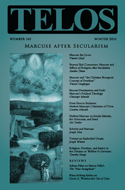 Current talk of the post-secular necessarily invites analysis of the nature of the secular, particularly its historical genesis and subsequent development. The task is to reject what Charles Taylor in A Secular Age has termed “subtraction stories” of the emergence of secularism, involving simplistic assumptions about the inexorable evaporation and attenuation of the religious, and instead understand the complex constitutive role religion has played in the construction of the secular. Marcuse’s work is of interest in this respect because beginning with his 1930s analysis of what he terms “the Christian bourgeois concept of freedom” within the Protestant Reformation, he explores the ways in which he believes modern secular society emerged out of Christianity. Current talk of the post-secular necessarily invites analysis of the nature of the secular, particularly its historical genesis and subsequent development. The task is to reject what Charles Taylor in A Secular Age has termed “subtraction stories” of the emergence of secularism, involving simplistic assumptions about the inexorable evaporation and attenuation of the religious, and instead understand the complex constitutive role religion has played in the construction of the secular. Marcuse’s work is of interest in this respect because beginning with his 1930s analysis of what he terms “the Christian bourgeois concept of freedom” within the Protestant Reformation, he explores the ways in which he believes modern secular society emerged out of Christianity.
Continue reading →
By Robert Ramos · Friday, January 3, 2014 As an occasional feature on TELOSscope, we highlight a past Telos article whose critical insights continue to illuminate our thinking and challenge our assumptions. Today, Robert Ramos looks at Jonathan Blair’s’s “Context, Event, Politics: Recovering the Political in the Work of Jacques Derrida” from Telos 141 (Winter 2007).
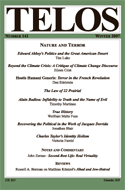 In “Context, Event, Politics: Recovering the Political in the Work of Jacques Derrida,” Jonathan Blair asks us to reconsider the standard narrative that has been used to categorize and also mischaracterize Derrida’s work. This is the position that Derrida’s early work begins with the institution of deconstruction and that at a point in the late 1980s Derrida’s thinking experienced a shift or a turn from deconstruction and to an explicit focus on the ethical and the political. Against this narrative, Blair argues that the question of politics appears as early as 1970. In “Context, Event, Politics: Recovering the Political in the Work of Jacques Derrida,” Jonathan Blair asks us to reconsider the standard narrative that has been used to categorize and also mischaracterize Derrida’s work. This is the position that Derrida’s early work begins with the institution of deconstruction and that at a point in the late 1980s Derrida’s thinking experienced a shift or a turn from deconstruction and to an explicit focus on the ethical and the political. Against this narrative, Blair argues that the question of politics appears as early as 1970.
Continue reading →
By Nathaniel Greenberg · Monday, December 30, 2013 The appointment of the Minister of Industry, the so-called “technocrat” Mehdi Jomaa, to form a caretaker government in Tunisia on the eve of the revolution’s third anniversary, threw into stark relief the country’s complex struggle for democracy following the January 14 revolution. The announcement came in the wake of the Islamist party Ennahdha’s sudden renunciation of the Prime Minister’s office in September, ostensibly a sign of cooperation in the face of mounting criticism surrounding the government’s failure to investigate the assassinations of two political opposition figures. A number of Western media outlets, including the New York Times, quickly absorbed the narrative advanced by Ennahdha’s leader and spiritual guide Rachid al-Ghannouchi referring to the appointment of Jomaa as a “yielding of power.” This narrative of concession, however, elides the fact that neither of the Parliament’s largest secular opposition parties supported the vote to appoint Jomaa, or, for that matter, that the vote failed to achieve a majority. Faced with mounting criticism, Ennahdha’s spokesman denied reports in Le Monde from the previous day that the appointment had been directed by lobbying efforts from the U.S. Department of State and the E.U.[1] In other words, Ennahdha leaders defended the appointment as a victory as much as they sold it as a concession. The former lends itself to the long-standing critique on the part of secular pundits within Tunisia that Ennahdha has been playing a long game and is determined to alter the secular nature of the State. The latter suggests that the Islamist party is representative of a democratic majority and envisions a path of moderate conservative governance along the lines of the AKP in Turkey.
Continue reading →
By Telos Press · Monday, December 30, 2013 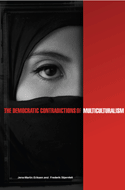 Congratulations to Jens-Martin Eriksen and Frederik Stjernfelt for winning best title in the non-fiction category at the London Book Festival for their book The Democratic Contradictions of Multiculturalism, published by Telos Press. Congratulations to Jens-Martin Eriksen and Frederik Stjernfelt for winning best title in the non-fiction category at the London Book Festival for their book The Democratic Contradictions of Multiculturalism, published by Telos Press.
Congratulations in the same category to Timothy W. Luke and Ben Agger, who received Honorable Mention for their anthology A Journal of No Illusions: Telos, Paul Piccone, and the Americanization of Critical Theory.
The awards will be presented at the British Library on January 23, 2014.
To celebrate the awards, we’re offering a 20% discount on both books when purchased at our online store through the end of January.
Continue reading →
By Matt Applegate · Tuesday, December 17, 2013 As an occasional feature on TELOSscope, we highlight a past Telos article whose critical insights continue to illuminate our thinking and challenge our assumptions. Today, Matt Applegate looks at Yvette Biro’s “The Intellectual Film: Eisenstein’s Plan to Film Marx’s Capital“ from Telos 39 (Spring 1979).
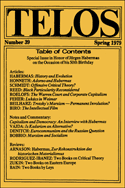 It is difficult to think of what cinema is in the present, and indeed, what cinema might be in the future, outside of large studio systems, box office opening numbers, and global profit intake. Even so-called “independent” films often circulate in a virtual minor league of the Hollywood studio system, vying for wide release. To be sure, cinema’s thorough commodification both limits its potential for aesthetic experimentation and makes it easier to equate it with other forms of media. When cinema becomes secondary to the metrics of profit, its distinct aesthetic qualities are subordinate to its function as a product comprised of moving images and sound. Moreover, as film moves away from celluloid and toward digital formats, one is compelled to ask what makes cinema distinct as visual technology is homogenized. This is not to say that cinematic experience and practice are bankrupt aesthetic qualities or that film is doomed to devolve into an indistinct mesh of CGI and user-generated websites like YouTube and Vine. Rather, as Yvette Biro suggests in her “The Intellectual Film: Eisenstein’s Plan to Film Marx’s Capital,” the horizon of cinematic thought and practice is perhaps best imagined by examining the relation between ideology and cinematic aesthetics. It is difficult to think of what cinema is in the present, and indeed, what cinema might be in the future, outside of large studio systems, box office opening numbers, and global profit intake. Even so-called “independent” films often circulate in a virtual minor league of the Hollywood studio system, vying for wide release. To be sure, cinema’s thorough commodification both limits its potential for aesthetic experimentation and makes it easier to equate it with other forms of media. When cinema becomes secondary to the metrics of profit, its distinct aesthetic qualities are subordinate to its function as a product comprised of moving images and sound. Moreover, as film moves away from celluloid and toward digital formats, one is compelled to ask what makes cinema distinct as visual technology is homogenized. This is not to say that cinematic experience and practice are bankrupt aesthetic qualities or that film is doomed to devolve into an indistinct mesh of CGI and user-generated websites like YouTube and Vine. Rather, as Yvette Biro suggests in her “The Intellectual Film: Eisenstein’s Plan to Film Marx’s Capital,” the horizon of cinematic thought and practice is perhaps best imagined by examining the relation between ideology and cinematic aesthetics.
Continue reading →
|
|
 Norberto Bobbio’s 1978 article “Is There a Marxist Theory of the State?” marks a turning point in the history of Telos. The “red decade” was coming to a close in the mid-1970s, and the New Left was falling into disarray. Hence, Bobbio writes an epitaph in this 1978 article, which makes the convincing case that the Left was never able to develop a political theory that included a positive concept of the political state. In the years following Bobbio’s article, the Telos group would begin to look elsewhere. As Paul Piccone and Gary Ulmen later explained, “Telos‘ initial interest in [Carl] Schmitt’s work was triggered in the 1980s by the realization, in the collapse of the New Left and under the influence of Norberto Bobbio’s criticism, that the Left in general and Marxism in particular had no political theory.”[1] Bobbio moved Telos away from “revolution, dialectic, commodity fetishism, liberation, alienation, and monopoly capitalism”[2] to Carl Schmitt, federalism, and populism.
Norberto Bobbio’s 1978 article “Is There a Marxist Theory of the State?” marks a turning point in the history of Telos. The “red decade” was coming to a close in the mid-1970s, and the New Left was falling into disarray. Hence, Bobbio writes an epitaph in this 1978 article, which makes the convincing case that the Left was never able to develop a political theory that included a positive concept of the political state. In the years following Bobbio’s article, the Telos group would begin to look elsewhere. As Paul Piccone and Gary Ulmen later explained, “Telos‘ initial interest in [Carl] Schmitt’s work was triggered in the 1980s by the realization, in the collapse of the New Left and under the influence of Norberto Bobbio’s criticism, that the Left in general and Marxism in particular had no political theory.”[1] Bobbio moved Telos away from “revolution, dialectic, commodity fetishism, liberation, alienation, and monopoly capitalism”[2] to Carl Schmitt, federalism, and populism.  Current talk of the post-secular necessarily invites analysis of the nature of the secular, particularly its historical genesis and subsequent development. The task is to reject what Charles Taylor in A Secular Age has termed “subtraction stories” of the emergence of secularism, involving simplistic assumptions about the inexorable evaporation and attenuation of the religious, and instead understand the complex constitutive role religion has played in the construction of the secular. Marcuse’s work is of interest in this respect because beginning with his 1930s analysis of what he terms “the Christian bourgeois concept of freedom” within the Protestant Reformation, he explores the ways in which he believes modern secular society emerged out of Christianity.
Current talk of the post-secular necessarily invites analysis of the nature of the secular, particularly its historical genesis and subsequent development. The task is to reject what Charles Taylor in A Secular Age has termed “subtraction stories” of the emergence of secularism, involving simplistic assumptions about the inexorable evaporation and attenuation of the religious, and instead understand the complex constitutive role religion has played in the construction of the secular. Marcuse’s work is of interest in this respect because beginning with his 1930s analysis of what he terms “the Christian bourgeois concept of freedom” within the Protestant Reformation, he explores the ways in which he believes modern secular society emerged out of Christianity.  In “Context, Event, Politics: Recovering the Political in the Work of Jacques Derrida,” Jonathan Blair asks us to reconsider the standard narrative that has been used to categorize and also mischaracterize Derrida’s work. This is the position that Derrida’s early work begins with the institution of deconstruction and that at a point in the late 1980s Derrida’s thinking experienced a shift or a turn from deconstruction and to an explicit focus on the ethical and the political. Against this narrative, Blair argues that the question of politics appears as early as 1970.
In “Context, Event, Politics: Recovering the Political in the Work of Jacques Derrida,” Jonathan Blair asks us to reconsider the standard narrative that has been used to categorize and also mischaracterize Derrida’s work. This is the position that Derrida’s early work begins with the institution of deconstruction and that at a point in the late 1980s Derrida’s thinking experienced a shift or a turn from deconstruction and to an explicit focus on the ethical and the political. Against this narrative, Blair argues that the question of politics appears as early as 1970.  Congratulations to Jens-Martin Eriksen and Frederik Stjernfelt for winning best title in the non-fiction category at the London Book Festival for their book
Congratulations to Jens-Martin Eriksen and Frederik Stjernfelt for winning best title in the non-fiction category at the London Book Festival for their book  It is difficult to think of what cinema is in the present, and indeed, what cinema might be in the future, outside of large studio systems, box office opening numbers, and global profit intake. Even so-called “independent” films often circulate in a virtual minor league of the Hollywood studio system, vying for wide release. To be sure, cinema’s thorough commodification both limits its potential for aesthetic experimentation and makes it easier to equate it with other forms of media. When cinema becomes secondary to the metrics of profit, its distinct aesthetic qualities are subordinate to its function as a product comprised of moving images and sound. Moreover, as film moves away from celluloid and toward digital formats, one is compelled to ask what makes cinema distinct as visual technology is homogenized. This is not to say that cinematic experience and practice are bankrupt aesthetic qualities or that film is doomed to devolve into an indistinct mesh of CGI and user-generated websites like YouTube and Vine. Rather, as Yvette Biro suggests in her “The Intellectual Film: Eisenstein’s Plan to Film Marx’s Capital,” the horizon of cinematic thought and practice is perhaps best imagined by examining the relation between ideology and cinematic aesthetics.
It is difficult to think of what cinema is in the present, and indeed, what cinema might be in the future, outside of large studio systems, box office opening numbers, and global profit intake. Even so-called “independent” films often circulate in a virtual minor league of the Hollywood studio system, vying for wide release. To be sure, cinema’s thorough commodification both limits its potential for aesthetic experimentation and makes it easier to equate it with other forms of media. When cinema becomes secondary to the metrics of profit, its distinct aesthetic qualities are subordinate to its function as a product comprised of moving images and sound. Moreover, as film moves away from celluloid and toward digital formats, one is compelled to ask what makes cinema distinct as visual technology is homogenized. This is not to say that cinematic experience and practice are bankrupt aesthetic qualities or that film is doomed to devolve into an indistinct mesh of CGI and user-generated websites like YouTube and Vine. Rather, as Yvette Biro suggests in her “The Intellectual Film: Eisenstein’s Plan to Film Marx’s Capital,” the horizon of cinematic thought and practice is perhaps best imagined by examining the relation between ideology and cinematic aesthetics. 

